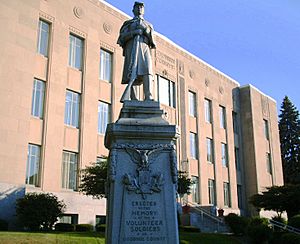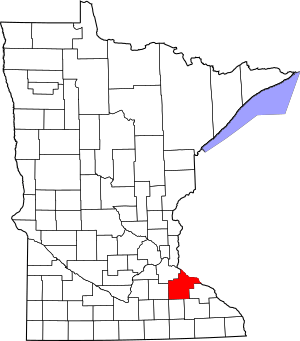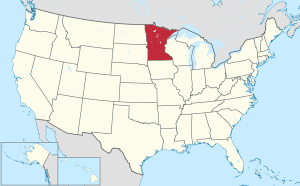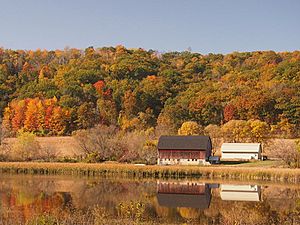Goodhue County, Minnesota facts for kids
Quick facts for kids
Goodhue County
|
|||||
|---|---|---|---|---|---|

Goodhue County Courthouse in Red Wing, Minnesota
|
|||||
|
|||||

Location within the U.S. state of Minnesota
|
|||||
 Minnesota's location within the U.S. |
|||||
| Country | |||||
| State | |||||
| Founded | March 5, 1853 | ||||
| Named for | James M. Goodhue | ||||
| Seat | Red Wing | ||||
| Largest city | Red Wing | ||||
| Area | |||||
| • Total | 780 sq mi (2,000 km2) | ||||
| • Land | 757 sq mi (1,960 km2) | ||||
| • Water | 24 sq mi (60 km2) 3.0%% | ||||
| Population
(2020)
|
|||||
| • Total | 47,582 | ||||
| • Estimate
(2023)
|
48,035 |
||||
| • Density | 62.9/sq mi (24.3/km2) | ||||
| Time zone | UTC−6 (Central) | ||||
| • Summer (DST) | UTC−5 (CDT) | ||||
| Congressional district | 1st | ||||
Goodhue County is a county in the U.S. state of Minnesota. In 2020, about 47,582 people lived here. The main city and place where the county government is located is Red Wing. A large part of the Prairie Island Indian Community is also found within Goodhue County.
Goodhue County is part of the Red Wing, MN area. It is also included in the larger Minneapolis-St. Paul, MN-WI area.
Contents
History of Goodhue County
Goodhue County was created on March 5, 1853. It was formed from a part of Wabasha County. The county is named after James Madison Goodhue (1810–1852). He started the first newspaper in the Minnesota area, called The Minnesota Pioneer.
Early Settlers and Values
The first settlers in Goodhue County mainly came from New England or upstate New York. They were often descendants of English Puritans. These early settlers brought their values with them. They strongly believed in education and were against slavery. They built farms, schools, and government buildings using local materials.
Later, in the late 1800s and early 1900s, many immigrants from Germany and Norway moved to the area. There were also some Swedish immigrants.
First College in Minnesota
Hamline University, Minnesota's first college, began in Red Wing in 1854. It closed during the Civil War. The college later reopened in 1869 in Saint Paul.
Wheat Farming and Changes
In the mid-1800s, Goodhue County was a top producer of wheat. For a few years, it grew more wheat than any other county in the country. However, fires at two mills in Red Wing in the 1880s changed things. Also, new railroad lines made it easier for farmers to send their wheat to mills in Minneapolis. This caused Goodhue County's importance in the wheat trade to decrease around 1900.
Goodhue County was also home to Minnesota's first public swimming pool.
Presidential Visit
In October 1960, President Dwight D. Eisenhower visited Goodhue County. He came for a special event to open the Hiawatha Bridge. This new bridge replaced the Old High Bridge, which had crossed the Mississippi River since 1895. About 20,000 people came to see President Eisenhower. He hoped his visit would help Richard Nixon win the 1960 presidential election. However, John F. Kennedy won the election and became president.
Geography and Nature
Goodhue County is located on Minnesota's border with Wisconsin. Lake Pepin is across the border. The Cannon River flows east through the northern part of the county. It empties into Lake Pepin. The Little Cannon River flows north and joins the Cannon River at Cannon Falls. The North Fork of the Zumbro River flows east through the southern part of the county.
The county has rolling hills and high cliffs along the river valleys. The land slopes towards the east and north. The highest point is about 1,260 feet (384 meters) above sea level. Goodhue County covers about 780 square miles (2,020 km²). About 757 square miles (1,961 km²) is land, and 24 square miles (62 km²) is water. Goodhue is one of 17 Minnesota counties that has more savanna soils than prairie or forest soils.
Lakes in Goodhue County
Goodhue County has many lakes, including:
- Birch Lake
- Brewer Lake
- Cannon Lake
- Clear Lake
- Devils Lake
- Espen Lakes
- Goose Lake
- Lake Byllesby
- Larson Lake
- Nelson Lake
- North Lake
- Rattling Springs Lake
- Spring Banks Lake
- Spring Creek Lake
- Sturgeon Lake
- Twin Lakes
Major Roads and Highways
Several important highways pass through Goodhue County:
 U.S. Highway 52
U.S. Highway 52 U.S. Highway 61
U.S. Highway 61 U.S. Highway 63
U.S. Highway 63 Minnesota State Highway 19
Minnesota State Highway 19 Minnesota State Highway 20
Minnesota State Highway 20 Minnesota State Highway 56
Minnesota State Highway 56 Minnesota State Highway 57
Minnesota State Highway 57 Minnesota State Highway 58
Minnesota State Highway 58 Minnesota State Highway 60
Minnesota State Highway 60 Minnesota State Highway 246
Minnesota State Highway 246 Minnesota State Highway 292
Minnesota State Highway 292 Minnesota State Highway 316
Minnesota State Highway 316
Neighboring Counties
Goodhue County shares borders with these counties:
- Pierce County, Wisconsin - north
- Pepin County, Wisconsin - northeast
- Wabasha County - east
- Olmsted County - southeast
- Dodge County - south
- Rice County - west
- Dakota County - northwest
Protected Natural Areas
Goodhue County has several protected natural areas, including:
- Cannon River Turtle Preserve Scientific and Natural Area
- Frontenac State Park
- Miesville Ravine Park Reserve (part)
- North Fork Zumbro Woods Scientific and Natural Area
- Spring Creek Prairie Scientific and Natural Area
- Woodbury State Wildlife Management Area
Communities in Goodhue County
Goodhue County has several cities and smaller communities.
Cities
- Bellechester (part)
- Cannon Falls
- Dennison (part)
- Goodhue
- Kenyon
- Lake City (part)
- Pine Island (part)
- Red Wing (county seat)
- Wanamingo
- Zumbrota
Other Communities
- Frontenac (a special type of community called a Census-designated place)
There are also many smaller, unincorporated communities (villages or hamlets not officially part of a city):
- Belle Creek
- Belvidere Mills
- Bombay
- Claybank
- Forest Mills
- Hader
- Hay Creek
- Roscoe
- Ryan
- Skyberg
- Sogn
- Stanton
- Vasa
- Wacouta
- Wangs
- Wastedo
- Welch
- White Rock
Some places that used to be towns, but are now empty or abandoned, are called ghost towns:
- Central Point Township
- Fairpoint
- Florence
- Thoten/Belvidere
Goodhue County is also divided into smaller areas called townships.
Education in Goodhue County
Goodhue County is served by several school districts, which help provide education for students in the area:
- Cannon Falls Public School District
- Faribault Public School District
- Goodhue Public School District
- Hastings Public School District
- Kenyon-Wanamingo School District
- Lake City Public School District
- Northfield Public School District
- Pine Island Public School District
- Randolph Public School District
- Red Wing Public School District
- Triton School District
- Zumbrota-Mazeppa School District
Images for kids
See also
 In Spanish: Condado de Goodhue para niños
In Spanish: Condado de Goodhue para niños
 | Anna J. Cooper |
 | Mary McLeod Bethune |
 | Lillie Mae Bradford |






